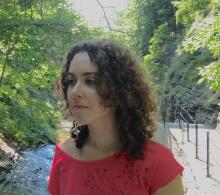Editor’s Note: The Department of Spanish & Portuguese Studies welcomes three new Assistant Professors in the 2021-2022 academic year. We will be profiling each of these faculty members over the course of the year.
Elizabeth Hochberg is the new specialist in contemporary Latin America in the Department of Spanish & Portuguese Studies at the University of Washington. Hochberg, who first began teaching for the department as a Teaching Associate in the summer of 2016, was hired as an Assistant Professor, starting in the autumn of 2021.
“I specialize in twentieth-century Latin American literary and cultural studies, with an emphasis on the Southern Cone.” Hochberg added, of her particular area of interest, “I am particularly interested in Chilean film and literature in relation to social movements and media studies.”
This year Hochberg will be teaching two courses, SPAN 461 in winter quarter, and a seminar for graduate students in the spring. For her winter course “[we] will study intersections between cultural production and political revolution, with a particular focus on Chile. We will look at diverse examples of film, music, and literary production as a mode of exploring the ways in cultural forms change to reflect or respond to structural transformation.” The spring quarter seminar meanwhile, “…will likely focus on twentieth-century proletarian literature and the ways in which novels, stories, and poetry accompany the rise of workers movements in Latin America.”
Hochberg has been active in publishing, with her most recent article “Lectores de imágenes en tiempos de revolución: 'Descomedidos y chascones' (1973) de Carlos Flores” focusing on “the presence of image reading within Chilean director Carlos Flores’ filmic exploration of young people during Salvador Allende’s Popular Unity government entitled Descomedidos y chascones (1973)”. This article can be found in the 2021 edition of the journal Kamchatka. Revista de análisis cultural. She is also the co-translator of a forthcoming selection of poems by Chilean poet Vicente Huidobro, a collaboration of the Fundación Vicente Huidobro, University of Washington and RIL Editores, entitled Poetry Is a Celestial Attack. La poesía es un atentado celeste.
In addition to these publications, Hochberg is also working on a book manuscript which, “…explores the concept of popular power—traditionally linked to Chile’s worker-led land and factory takeovers of the early 1970s—in relation to novels, short stories, comics, and film produced during the Allende years.” It will also examine the interactions “…between individual creative works and state educational initiatives.” Hochberg shared some of her research for this book at a department colloquium in May 2019 with the talk “Writing and Recording Popular Power: Mass Media Reflections During Chile’s Popular Unity.”
Hochberg lives in Seattle with her husband Francisco (an Assistant Professor, also in the department) and their daughter: “I have really enjoyed living in Seattle and am particularly impressed by its many parks, independent coffee shops, and bookstores. I lived in both big cities and small towns before moving here, and I find Seattle to be a great mix of both types of experiences. I also appreciate Seattle’s public transportation system, which has made it much easier for me to get to many places in the city.” Seattle’s temperate climate is another thing that Hochberg enjoys. “One of my favorite things about Seattle is seeing so much green in winter – it is great that so many plants here continue to grow all year round! Seattle’s foliage and climate often remind me of Southern Chile, a place that I have loved visiting in the past.”
Elizabeth Hochberg is originally from the Chicago area. She earned her PhD in Spanish and Portuguese from Princeton University in 2018, after earning an MA from both Princeton and the Universidad Nacional Autónoma de México (UNAM) in 2014 and 2012, respectively. She graduated from Harvard University with a BA in Romance Languages and Literatures in 2007.
By Casey Colvin
